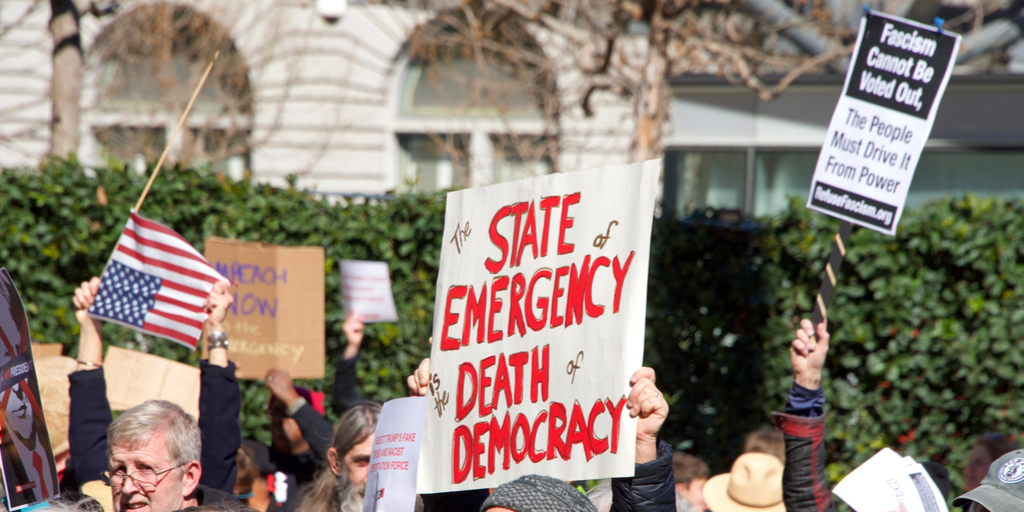The indignities and malefactions inflicted upon beloved cultural artefacts like Final Fantasy now shape American politics.
The Uses and Abuses of Cynicism
Alexander, superlative military genius and ruler of Macedonia, went to visit the great Cynic, Diogenes Laertus. Alexander was an admirer who, in some versions of the story, had expressed disappointment when Diogenes did not pay him a congratulatory visit after his ascent to the throne.
The king found the philosopher resting in a grove near Corinth. “Ask anything you wish of me!” he declared impressively.
“Get out of my light,” snapped Diogenes.
I can still remember laughing appreciatively the first time I read this famous story. For a teenaged philosophy major, Diogenes’ cheek could hardly fail to delight. Alexander, it seems, was equally impressed. Leaving the Cynic to his repose, he is said to have told his attendants that, “Were I not Alexander, I would wish to be Diogenes.”
Quite recently, I ran across this anecdote again in Helen Small’s The Function of Cynicism at the Present Time. It was pleasant to recall that first personal encounter with Diogenes, the dirty old man who befriended canines, and even labeled himself “Diogenes the dog.” Flamboyantly antisocial and extravagantly revolting, his charismatic appeal seems to cross both centuries and class lines. His devil-may-care audacity speaks to a freedom that even a king may envy. Young people will enjoy his puckish rebuke to authority. As a middle-aged mother of five, I now appreciate the story in a new way. It’s nice to find acknowledgement in the annals of ancient wisdom that the greatest gift in the world may sometimes be an uninterrupted nap.
Like the story, Cynicism itself can be approached from many directions, and appreciated in many different ways. Small is an excellent guide to the subject, illuminating its complexity with her trademark blend of literary criticism and thought-provoking social critique. An Oxford English professor, she has previously written on advanced age, and the value of the humanities. She has a knack for exploring cultural and moral questions with a literary critic’s eye for symbolism and style. Some readers may be surprised initially to see a writer like Small give such favorable treatment to cynicism, a critical posture or style that we normally associate with alienation and bitterness. Isn’t the world already sufficiently disenchanted? Don’t we have enough alienation and bitterness? It may not help to explain up-front that Small’s book delves into important questions about the nature of citizenship, academic freedom, the value of criticism, the promise and peril of ideology, and the role of conventional moral “guardrails” in preserving culture. What does all this have to do with a dirty old man from Sinope?
In fact, this is a remarkably graceful and cohesive book, which explores at length the insight that cynicism, ancient or modern, is not just a cause of disenchantment, but also a response to it. At certain points in life, we may be forced to acknowledge that people, ideas, or organizations we once trusted have let us down, failing to deliver on their initial promise. When that happens, we may have to choose (psychologically, or in more practical senses) between fight and flight. Cynicism fights. Refusing to accept a let-down with dignified resignation, it instead pushes the intellect into a more contrarian stance, skewering unworthy “suitors” (ideas, cultural practices, or actual human beings) with a zealous intensity.
Cynicism is dangerous. It can in some circumstances do real damage, both to society at large and to the cynic himself. Once the cynic has unmoored himself from a range of ordinary constraints, it may be hard to keep his aggression under control. There can be many good reasons to restrain an impulse to reach for the snarky comeback or the snide dismissal. Still, there may alsobe times when the cynical response is the right response. It can prime the intellect to discern the truth. It can break through maladaptive pieties or platitudes that have become burdensome. Finally, the cynical riposte, with its biting flair, may sometimes serve to buoy up the demoralized person, preventing a truly catastrophic slide into despair. For all its dangers, then, a controlled and strategic cynicism can have its appropriate place in healthy civic discourse. Small’s book might be seen as a tutorial in the “controlled burn” of a healthy cynicism.
At this point in the review, it may seem that a definition of cynicism is long overdue. A concise definition is difficult, because cynicism by nature combines belief, practice, and attitude in ways that are hard to codify. Standard dictionary definitions are likely to mention biting criticism, and a general distrust of other human beings. Cynicism is still connected to the ancient Cynics, however, and it is important to understand that Small sees meaningful connections between the cynicisms she explores in the book, and the philosophy of this ancient group of misanthropes, who saw themselves as practitioners of a demanding, ascetic philosophy that endeavored to strip away artifice and vanity.
The negative aspect of this lifestyle was always the most attention-grabbing, but the Cynics understood themselves to be pursuing happiness, not preaching despair. The point was not that life itself is hateful, but rather that conventional pursuits, attachments, and assumptions often make it so. Many Cynical ideas were absorbed into Stoicism, and later into the spiritual writings of Christian ascetics. Ancient Cynicism, as a skeptical and anti-conventional posture, was fairly antithetical to the formation of a unique philosophical school, but it found admirers and imitators across the centuries. In the chapters of this book, Small offers what is effectively a series of literary essays, with each chapter exploring a particular application of cynicism to a question of contemporary interest.
Moving through these chapters in sequence, it feels as though a wide lens is slowly being brought down to ever-narrower focus. Small begins with a chapter on Friedrich Nietzsche, the most subversive and philosophical of her subjects. In one of his most famous passages, Nietzsche re-cast the terse and acerbic Diogenes as a histrionic madman, running into the town square to proclaim the death of God. Nietzsche’s Diogenes is simultaneously incisive and ridiculous, and this, Small argues, is in no way accidental. Nietzsche was influenced by the Cynics, who demonstrated some very effective methods for debasing moral currency. At the same time, he was unimpressed by some of the more conventional aspects of the Cynic thought, especially the emphasis they placed on happiness as the appropriate goal for human life. Nietzsche was also very aware of the limitations of the Cynics’ (fairly unnuanced) egoism. There is in fact much evidence to suggest that humans are not consistently motivated by a navel-gazing concern with “looking out for number one.” Nietzsche’s Diogenes delivers an important message, while also demonstrating how easy it is for cynicism to collapse into the kind of performative foolishness it ostensibly abhors.
The next two chapters cover closely-related ideas: free speech and honest criticism. In probing the limits of speech, Small examines the world of Thomas Carlyle, a talented controversialist who by most accounts crossed the lines of healthy civic discourse in some of his more outrageous works, especially Occasional Discourse on the Negro Question. Carlyle, unlike Nietzsche and the ancient Cynics, subscribed to a robust moralism that was broadly consonant with the prevailing social views of the day. He was no nihilist. Cynicism, for Carlyle, was meant to raise the bar on moral valuation, cutting ruthlessly through the weakness, hypocrisy, and sentimentalism that in his view were undercutting social discipline and virtue. One might see echoes of a similar strategy in contemporary cultural critics like Mark Steyn or Kevin Williamson; Small specifically mentions British writer Rod Liddle as a contemporary practitioner of this brand of controversialism. Following this, Small’s discussion of Matthew Arnold’s “The Function of Criticism” is interesting in part because Arnold, unlike Carlyle, is not normally regarded as a cynical thinker. Even so, his views on the freedom needed for honest criticism, have strong affinity with the ideas of the ancient Cynics.
Small’s fourth chapter, on cosmopolitanism, is especially interesting insofar as it explores the role of cynicism in helping us to navigate between opposing ideological poles. Diogenes Laertius famously declared himself to be “a citizen of the world.” What did he mean by this? Scholars have debated the question extensively, with some wanting to draw high-flown morals from the statement, while others observe that a glowing allegiance to the Brotherhood of Man would be wildly out of step with Diogenes’ broader comportment. Diogenes’ own cryptic statement draws us into a difficult puzzle. In its more rose-tinted forms, cosmopolitanism does indeed seem naïve. But nationalism also has a strong tendency towards artifice, corruption, and empty sentimentalism. Examining the question through the lenses of the George Eliot and Ford Madox Ford, Small suggests that a strategic cynicism may help us to balance these two commitments, drawing both to a manageable level. Finally, in her fifth chapter, Small examines contemporary controversies over academic freedom, reading Laura Kipnis’ writings on “rape culture” through the lens of Bertrand Russell and John Dewey. It’s an amusing chapter, not least because there are so few people today who would be pleased to see Russell, Dewey, and Kipnis as members of the same team.
Might cynicism offer us a constructive method of coming to grips with terrible politicians, without giving up on the struggle to serve the common good? Perhaps it can help us to achieve a balanced perspective on our fraught media landscape (both journalism and social media), or on our university system.
Coming to the end of this series of literary forays, we may feel both enriched and frustrated. It is fascinating to see how great writers have employed cynicism as they wrestle with important questions. The questions themselves, though, remain agonizingly open, and Small’s analysis has only reminded us how difficult they really are. We live in a time when questions about citizenship, free exchange, ideology, and the boundaries of civic engagement, are as difficult as they have ever been. In a culture perpetually rocked by shills and demagogues, ideological terrorists, copycat criminals, and zealots of every imaginable description, it is laughable to claim that unfettered speech is either safe or benign. We have a natural desire for “safe spaces,” and insofar as we mustinteract with people whose moral perspectives radically differ from our own, it would be comforting at least if we could turn down the volume of our cacophonous marketplace of ideas by imposing some rules for civic engagement. Of course we cando that, within certain boundaries, but Small’s analysis may lead us to reflect that in some cases, it may be inadvisable. Gentle speech, for all its virtues, really is not a reliable indicator of an honest or benevolent interlocutor. Liars can be honey-tongued. Prophets can be coarse.
If targeted cynicism can be an important tool for exposing falsehood and uncovering truth, then it may actually be quite important to allow it some license. A targeted cynicism, like a controlled burn, may sometimes be the salutary measure that prevents the forest from burning to the ground. If that’s true, though, then generating rules for a healthy, truth-seeking dialectic may be very difficult indeed.
That’s the half-empty perspective, but it is also possible to see this glass as half full. In a demoralized and disenchanted age, we may feel disheartened by the pervasive cynicism which, feels like an indicator of a civilization is in decline. It oozes from our partisan press and our political parties. Americans trust their government, their institutions, and one another, less than ever before. The young, instead of being hopeful and idealistic, seem disillusioned with love, beauty, politics, and the future generally. How can we rebuild our culture on that sort of foundation?
Small’s discussion of cynicism raises an interesting possibility. What if pervasive cynicism is not properly read as a sign of terminal cultural illness? What if it is more like the fever that indicates that the body is aggressively fighting the infection? Undoubtedly, there is much lazy and bad-faith cynicism in the world today, especially on social media, which incentivizes the witty riposte far more than the careful and sustained search for truth. Still, there is always the possibility that cynicism’s destructive power will ultimately be creative. If he is tough enough, the honest cynic has the potential to speak truth to power, freeing himself from falsehood and artifice, and commanding the admiration even of kings.
In modern life, we seem to be constantly searching for that freedom, and that critical distance. Reading through the chapters of this book, one wonders: might cynicism offer us a constructive method of coming to grips with terrible politicians, without giving up on the struggle to serve the common good? Perhaps it can help us to achieve a balanced perspective on our fraught media landscape (both journalism and social media), or on our university system. Maybe the ancient Cynics can teach us healthy strategies for handling activist aggression, or cancel culture, without losing all willingness to keep working for cultural renewal.
“Get out of my light,” said Diogenes. If an outcast can say this to a king, then any human being can, at need, make this demand of any other. Earthly corruption can never fully separate us from the truth, which is our rightful inheritance as rational beings. This realization gave the ancient Cynics tremendous power. That power is still accessible to us today.



